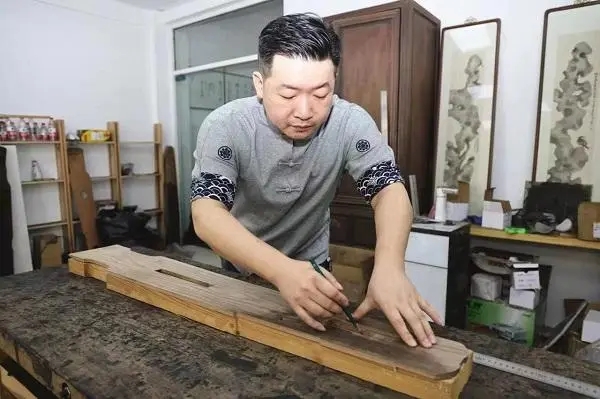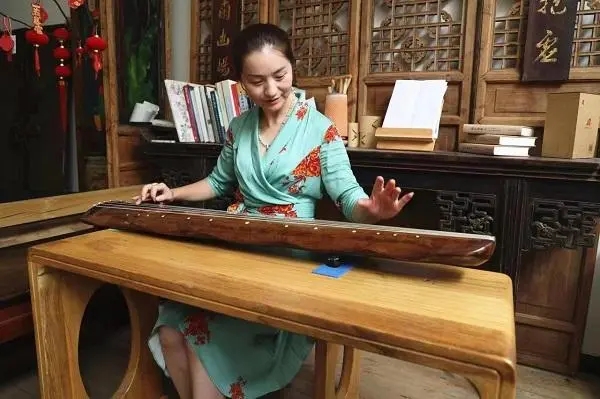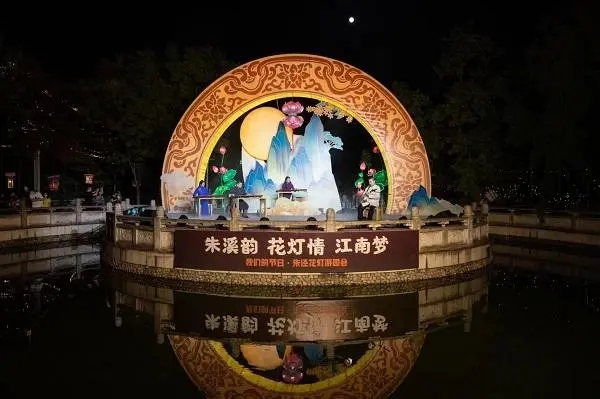Lighting up the Guqin Culture that prevailed in Jinshan, Wu, thousands of years ago with love
In Punan, Shanghai, there is an ancient town of Zhujing, which has a history of thousands of years. In the long years, it has bred a profound regional civilization and multiplied a bright intangible cultural heritage. There are a group of "inheritors" living in the town. Some of them spend most of their lives guarding a lantern, and some of them hold a brush to paint all the four seasons in the countryside... Recently, the town's guqin art has also been successfully included in the list of intangible cultural heritage in Jinshan District. A group of Zhujing guqin enthusiasts, with the support of the town's Party committee and government, have spent nearly 14 years researching the history of Zhujing guqin, refining their playing and chopping skills, and set up a heritage portal, Take inheritance as its own responsibility, and protect love with love.

The sound of the thousand year old town is endless
Guqin is one of the most ancient plucked musical instruments in the history of the Chinese nation. It was included in the World Heritage List by UNESCO in 2003. It has been handed down for more than 3000 years. Due to different regions, customs, apprenticeships and genealogies, various schools have emerged throughout the country.
Jinshan has continued the Wu style culture since ancient times, and the ancient Qin culture has a long history. According to historical records, the art history of Jinshan Guqin can be traced back to the Songjiang Prefecture of the Yuan Dynasty, and reached its peak in the Qing Dynasty. In addition to the exchange between literati and scholars, the art of guqin was also popular among the people. Historical records In the reign of Emperor Kangxi in the Qing Dynasty, Hu Xunlong, a zither player from Zhujing, was a famous connecting link between the preceding and the following in the field of ancient zither. In the period of the Republic of China, due to the turbulence of the family and the country, it declined gradually. In modern times, the ancient zither enthusiasts are still a minority. In order to reverse the decline and promote the better inheritance of the ancient zither art in the local area, a group of young people in Zhu Jing who are passionate about the charm of the ancient zither started the journey of seeking roots and teachers together.
"Wu Yue Zhehu Ancient Qin Club, Wu Yue understood very well that Zhehu Lake was a lake where Zhe trees were widely planted around Jinshan when it was under Songjiang Prefecture. Silkworms ate the silk from the leaves of Zhehu trees, which was most suitable for making strings, He was even more selfless about Zhuoqin, and he was also the first one to start looking for teachers. In 2006, in order to learn martial arts, Wang Wenfeng went back and forth to different cities in the Yangtze River Delta with his backpack, and finally succeeded in learning from Shi Jian, a disciple of Pei Jinbao from Wu Men Qin Club.
Common hobbies attract like-minded friends to join in one after another. In their stories, the playing and singing of guqin is a process from difficult to easy and then to difficult. Guqin has its own unique character reduction manual. At first glance, there are many symbols on the paper that look like Chinese characters but are not Chinese characters. Zhu Hongmei, the only female zither player in the zither club, said with a smile that she seemed to see the Heavenly Book when she first came into contact. But through the teacher's teaching, they soon found that as long as they remember the meaning of different radicals, they will know how to use the "four fingers and eight methods", and the rest is repeated practice. After many years of learning, everyone has formed their own style of playing the zither. However, there is no way to say who can play better. It is not self modesty, but because the zither playing would have been different because of different moods and temperament. Of course, different schools have different skills, and it is also a competition for beauty. In order to continue to improve, they often gather in various elegant gatherings with the friends of the Yangtze River Delta zither to learn and appreciate. They also improve their skills by participating in competitions at all levels. In the national guqin special performance "Our Voice in Space" held not long ago, Zhu Hongmei won the national bronze prize at one stroke.

Qin skills are mutually beneficial to Chen Xianxin
Art is born of zither, and zither is passed on by art. People who practice piano want to have their own "tailor-made". "The prosperity of ancient Qin culture and art cannot be separated from the inheritance of Zhuo Qin technology. If we want to pass it on, we must learn it, and we decide to try it." Since 2012, the founders of the Qin Club, Wang Wenfeng and Li Yuan, have started their exploration of Zhuo Qin. During this period, I learned from senior Zhuoqin masters such as Shigong Pei, and read a lot of ancient books such as "Biluozi Zhuoqin Method" and "Ancient Music". In particular, the "Qinglianfang Qinya" written by the famous Jinshan scholar Lin Youlin in the Ming Dynasty played an important role. The more books you read, the more difficult it is to make a satisfactory piano. They have been brewing for two years since they wanted to do it.
Zhuo Qin, from the selection of raw materials to each step of production, should be said that every link is critical, and any mistake will lead to unsatisfactory overall effect. Therefore, they have been working hard on the selection of wood, the preparation of paint, and the process of gray tire. At that time, in order to select the right wood, they went to other rural Taobao; In order to better understand the internal structure of the zither, they also bought several famous ancient zithers and took them to a professional organization to do CT... When entering the formal stage of the zither carving, they repeatedly refined and tuned 12 processes, more than 100 steps, and the painting process alone would go from coarse to fine, with multiple painting and multiple waiting rounds. Therefore, it is not surprising that a good zither was born as fast as 2 years and as slow as 5 years. They have also been recognized by the outside world for their dedication to carving the zither. They are a little famous in the "Zhuo Qin Circle". In 2020, Li Yuan took the "companion" of self carving the ancient zither to participate in the Shanghai Citizen Culture Festival Citizen Crafts Competition, and won the title of "100 Crafts Masters" in Shanghai. Today, many members have become members of the Chinese Guqin Culture and Art Promotion Committee. At present, there are not a few ordinary fans who come to the Qin Club to experience Zhuo Qin. There are also people from other places who send damaged ancient Qin to repair.

Learn from others and make progress
The intangible cultural heritage rooted in the fertile soil of Jiangnan culture, how to inherit and spread the local culture, from "live", live to fire? They also have their own thinking and practice.
In 2015, they co founded the Zhehu Shanfang Ancient Qin Zhuo Studio, and in 2017, they also founded the Wu Yun Zhehu Ancient Qin Club. At present, it is the only one in Jinshan that integrates playing and Zhuo. Since its establishment, the club has welcomed and sent many young people, children, old people and foreign friends, but many of them were attracted by the mystery of guqin, but for various reasons they stopped short. Members are well aware that the road to popularization is long and arduous.
In order to accelerate the popularization, since 2018, the zither club has paired up with the Zhonglou residential area of Zhujing Town to carry out public benefit classes in the summer, bringing the ancient zither culture into the community. For children's enlightenment, they have a set of methods. They not only tell the history, music and theory of the zither in a funny way, but also play "Little Star" and other children's songs into ancient zither music scores, or incorporate the rhythm of ancient poetry, so that children can learn and remember more easily, and make the ancient zither become the carrier of traditional Chinese education.
It is worth mentioning that the music club is also rooted in local culture. In the past two years, it has composed three songs adapted from the Song of Pulling the Boat sung by the eminent monk Chuanzi of the Tang Dynasty when he was boating in Luozhao Bay. In order to better present the artistic conception of each song, during the period, the members, centering on the legend of Chuanzi Monk, explored and sorted out the historical background and spiritual connotation of the birth and development of the Song of Poking the Boat. After the composition was completed, experts in the industry and local researchers of literature and history were invited to evaluate it and create it in awe, making it widely recognized in the multi-level intangible cultural heritage exhibition in urban towns.
"Rooted in the local culture, cultural creation has a source of vitality. Jinshan Guqin tells the story of Jinshan, which is a precious memory of the regional culture while inheriting the traditional elegant culture." Li Yuan introduced that there is still much we want to do about popularizing the local Guqin culture, such as continuing to explore the heritage of Zhujing Guqin, sorting it into books, compiling it into volumes for Guqin lovers to study; Select the ten most representative sights of Jinshan, Zhuo Qin as ten series, and conduct public welfare exhibition; With Chuanzi Monk as the background and Guqin as the carrier, create a "Impression Zhu Jing" style sitcom, making it a window to spread Zhu Jing culture
Involving musical instruments
Guess you like
Hot news
- 01 The Simple Difference Between Guqin, Se, and Guzheng
- 02 The difference between the five-stringed lute and the four-stringed lute
- 03 The difference between cymbals and cymbals in ethnic musical instruments
- 04 Dulcimer exam and performance repertoire
- 05 The handsome guy in 1997 is so advanced in pulling erhu! Netizen: Come and "wash your ears"
 渝公网安备 50010702504639号
渝公网安备 50010702504639号